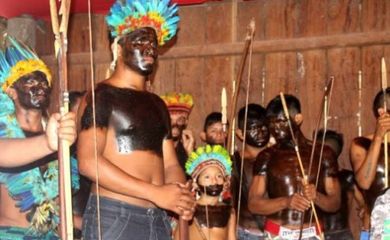Guaranis occupy historic site in São Paulo and call for land demarcation

Around 50 indians from the Guarani nation occupied on Wednesday (Apr. 16) the Pátio do Colégio de São Paulo, an institution whose erection marked the foundation of the city of São Paulo. The indigenous protesters called for the demarcation of the lands recognized by the National Indian Foundation (“Funai”) as traditionally indigenous within the municipality. Their goal is to draw society’s attention as well as to urge the Justice Ministry to sign the documents which officially turn these lands into indigenous property. The demonstrators will launch a campaign named “Sign already, Cardozo” (Portuguese: Assina Logo, Cardozo.” The name mentioned in the title is Justice Minister Eduardo Cardozo.

“It’s a way to shout to the minister and to the world, saying that all we want is a little piece of what was once ours. We’re not claiming the whole of São Paulo back, we’re not asking for the Pátio do Colégio, we just want these areas demarcated so we can live on culturally, spiritually and physically,” explained teacher and indigenous leader Jera Guarani.
In the Pátio, indians play music and dance according to their tradition as employees stand nearby and watch. The Pátio do Colégio is an archeological complex, including a café and a museum. There, the first mass was celebrated, and the first building of the city of São Paulo was erected, namely the Colégio de São Paulo, founded by Jesuits Manuel da Nóbrega and José Anchieta in 1554, designed to teach the Christian faith to indians from around the area.
For the descendants of these indians, three areas in São Paulo were recognized as traditionally Guarani in the 1980’s. However, they were never large enough for the communities to thrive physically and culturally. “We’re members of a traditional people that lives in balance with nature. For some time now, we’ve suffered from the lack of territory for planting with our children, for hunting, and teaching respect for nature,” the Guarani teacher noted.
For the demarcation of these lands already recognized as indigenous to be effected, a document must be signed by the minister of justice. “We believe he’s been placed under pressure by the farm and field workers. The indigenous people in Brazil are seen as an obstacle, a hindrance to progress,” Jera argued.
Without the demarcation, indians are threatened with eviction and find it hard to keep their traditions alive in the areas where they currently live, like the Tekoa Pyau village, in Pico do Jaraguá. A judge ruled that the indians living in the region should be removed.
Teacher Jera Guarani was firm in her remarks: “We’re here to fight for our culture, for our children and for the preservation of our way of life. To this day, there are people who don’t speak Portuguese in our villages, even after the European invasion and after suffering such a large number of attacks.”
Translated by Fabrício Ferreira
Fonte: Guaranis occupy historic site in São Paulo and call for land demarcation



